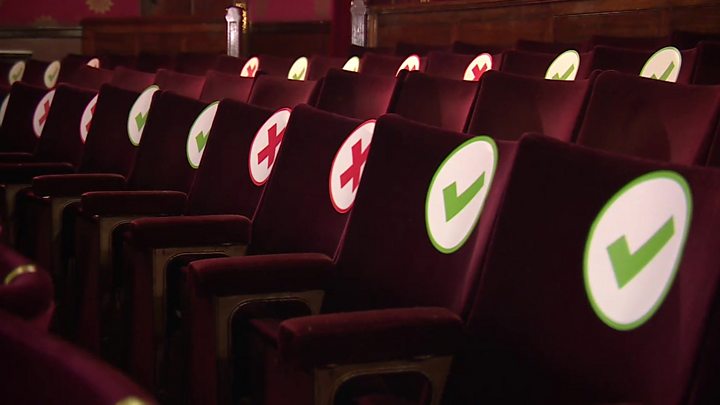 Image copyright
PA Media
Image copyright
PA Media
The arts industry has largely welcomed the government's announcement of with a £1.57bn support package.
It followed several weeks of lobbying from theatres, music venues, art galleries and other cultural institutions, many of which said they were on the brink of collapse.
While the funding has been warmly welcomed, many venues are sounding a note of caution as they await further details on how the money will be allocated and news of when venues will be allowed to re-open.
Culture secretary Oliver Dowden said the package is all "new money" and has two broad aims - to preserve "crown jewel" venues like the Royal Albert Hall and national galleries, while also helping local institutions across the UK.
How the arts have reacted
Theatres
Image copyright The Old Vic Image caption Socially distanced rehearsal at London's Old VicFreelance theatre director Ian Rickson, said: "First and foremost, we must ensure that this package helps the freelance community. This isn't just famous actors, but stage managers, set builders, wig makers, in fact all the teams who put together the shows. Artists in the theatre need safe ground in order to take risks.
"What people don't know is that a high proportion of these freelancers live below the poverty line or at least with very unstable incomes. Before the pandemic this was difficult enough but freelancers can't be furloughed and a significant proportion don't qualify for SSEIS (the self-employed income support scheme)."
The funding was well-received by composer Lord Lloyd-Webber, who said the news is "truly welcome at a time when so many theatres, orchestras, entertainment venues and other arts organisations face such a bleak future".
Theatre impresario Cameron Mackintosh said the news "was most welcome" but "it is now critical that we are given immediate guidance when social distancing will be phased out so we can make firm plans to re-open as soon as practical."
The Royal Albert Hall's chief executive Craig Hassall described the news as "an absolute life saver for all of us".
A string of theatres have already announced plans to make staff redundant in recent weeks, after being closed since the coronavirus pandemic took hold earlier this year.

Media playback is unsupported on your device
Adrian Vinken, the chief executive of the Theatre Royal in Plymouth told BBC Radio 4's Today programme it was "impossible to say" if the announcement would be enough to prevent up to 100 job losses there until more detail is released.
"Until the whole sector knows when we can reopen without social distancing and start trading again... there is no security in the sector whatsoever but hopefully what the government is doing here is giving us that lifeline to keep going until that point is discernible."
Nicholas Hytner, former director of the National Theatre and the founder of London's Bridge Theatre, said: "It's a much better plan than anyone expected. It's the result of joined up, tenacious and detailed lobbying going on under the radar which was listened to with great attention.
"The only proper response is to congratulate them and thank them for the size of the package."
GETTY
How much do theatres contribute?
£1.28bnAnnual ticket revenue
290,000Workers employed
34mAnnual visitors
£133mAnnual VAT payments
70%Jobs at risk
Source: UK Theatre, SOLT, ONS, Latest figures for 2018
Equity, the performers' union, welcomed the support but its general secretary, Christine Payne, said it was important that the funding didn't just prop up venues.
"If this investment does not reach creative workers - the actors, dancers, stage management, singers, variety artists, directors, designers, choreographers and many other highly skilled workers in our talent base, we risk the diversity and success of the wider creative industries - worth £112bn to the economy.
"These workers have campaigned for this deal; they can't be left behind."
This was echoed by the fears of a freelance worker on Twitter:
Philippa Childs, head of the Bectu union which supports workers across the media and entertainment industry, said the support package was overdue.
She added: "At long last the government have woken up to our warnings and those of the whole creative sector, that without support, we stood to lose a huge amount of our world-beating creative industries.
"We will now be scrutinising the details of this package to make sure it lives up to the real needs of our sector."
Julian Bird, chief executive of The Society of London Theatre and UK Theatre, said it "hugely welcomed" the funding.
The chief executives of The National Theatre, Rufus Norris and Lisa Burger, said they "feel very positive that this major investment will reach and sustain the vital talent and infrastructure".
Image copyright Getty Images Image caption Kwame Kwei-Armah says he feels "relieved".Kwame Kwei-Armah, artistic director of The Young Vic, told Times Radio that he and his colleagues are "relieved".
Julia Fawcett, chief executive of The Lowry in Salford, said: "The announcement of £1.57bn of emergency investment in the UK's culture sector is welcome news, but we are fast running out of time.
"This lifeline will come too late for some organisations who have already been forced to close their doors for good or made valued employees redundant."
Jon Morgan of The Theatres Trust said: "It remains to be seen whether this amount will be sufficient to replace the furlough scheme, as it begins to taper from August and ends in October, at a time when we still do not have timescales for theatres reopening."
Neil Constable, CEO of Shakespeare's Globe, said the news meant they "now have the opportunity to plan to reopen fully by early 2021. We will of course be taking opportunities, if social distancing allows, to reopen earlier".
Fiona Allan, president of UK Theatres and the artistic director of The Birmingham Hippodrome, said the venue "was overjoyed" at the investment.
"We are now able to turn our focus to rebuilding what we have lost and planning for the future."
Art galleries and museums
Image copyright Getty Images Image caption Museums are starting to re-open after lockdown but some - like Birmingham's Museum and Art Gallery remain closed.Arts Council chairman Sir Nicholas Serota told BBC News the funding was "a very good result".
He said: "Now it's up to the arts organisations and the Arts Council to make best use of this money and bring the arts back into communities across the county. This announcement gives us the tools to help build a recovery."
The chief executive of the Arts Council of Wales said he was "absolutely delighted" by the announcement, adding the funding was "an absolute lifeline".
Andy Eagle, chief executive of Cardiff's Chapter Arts Centre, said: "It provides enormous security, enormous hope for the sector."
The Arts Council of Northern Ireland said it was "delighted" with the "lifeline support"
The Tate, The Science Museum Group, The Natural History Museum and The National Gallery were among those who also welcomed the funding.
Sir Ian Blatchford, chair of the National Museums Directors Council said: "This is welcome news for the museum sector, both in the scale of funding and as a strategic commitment to our role in the life of the country."
Kully Thiarai, creative director & CEO of Leeds 2023, said: "Across Leeds and West Yorkshire, the workers and performers in our region's great cultural institutions and the independent artists and venues embedded in communities, are waking up to some positive news. After months of anxiety and uncertainty, the Government has thrown a much needed life-line that will help many stay afloat and plan for the future.
Music
Image copyright Getty Images Image caption The Royal Opera House said the funding announcement was "a catalyst".Music Venue Trust chief executive Mark Davyd said it "warmly welcomes this unprecedented intervention into Britain's world class live music scene".
He added: "This fund provides the opportunity to stabilise and protect our vibrant and vital network of venues and gives us the time we need to create a plan to safely reopen live music."
Geoff Taylor, chief executive of the BPI & Brit Awards, said: "We are delighted that the government has recognised the special importance of the arts and creativity to our national life.
"We look forward to further details on how the funds will be allocated, but naturally warmly welcome specific references from the PM and the Chancellor to a lifeline for our cherished music venues, and to support for the arts, which should assist our classical music sector."
Sir Simon Rattle, director of the London Symphony Orchestra, called for the money to be "distributed as fast as possible".
The Royal Opera House said in a statement that "the package of support will be a catalyst for unlocking the extraordinary creativity embedded in the UK's world-renowned creative industries".
Stephen Gilchrist, who runs Brixton Hill Studios, a music rehearsal and recording facility in south London, said the support was "very important", but that it doesn't mention companies that support the music industry.
"The nearest thing that would come to what we would do says 'basement venues'," he said. "So that shows that really important grassroots venues are covered, but it doesn't cover the parts of the sector that may look, on the outside, like they are commercial - the hire companies and the touring travel companies and people like us, the rehearsal and recording studios. So there is a possibility that we'll have another fight on our hands."
Follow us on Facebook, or on Twitter @BBCNewsEnts. If you have a story suggestion email entertainment.news@bbc.co.uk.

 5 years ago
714
5 years ago
714 

